|
|
|
Sort Order |
|
|
|
Items / Page
|
|
|
|
|
|
|
| Srl | Item |
| 1 |
ID:
146511
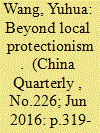

|
|
|
|
|
| Summary/Abstract |
This article presents a large-scale, systematic study of politically connected firms in China. It was conducted by compiling a database of all the publicly traded firms in China in 1993, 2002 and 2012 that codes the biographies of hundreds of thousands of board members. I find that there has been a significant increase in the percentage of firms that are connected with the national government in the last 20 years. This casts doubt on a popular argument that businesses in China have primarily relied on “local protectionism.” I interpret this as a result of firms' need to connect with powerful and stable institutions. I test this by examining the impact of the fall of Chen Liangyu on firms in Shanghai.
|
|
|
|
|
|
|
|
|
|
|
|
|
|
|
|
| 2 |
ID:
146517
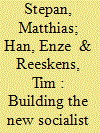

|
|
|
|
|
| Summary/Abstract |
Ever since the introduction of the national political programme of “Building a new socialist countryside” (BNSC) in the early 2000s, renewed focus has been cast on how the Chinese government manages the gap between its rural and urban areas in the new millennium. Previous research has mostly studied the social and political consequences of the BNSC initiative without paying particular attention to its effects on public opinion. In this article, we present an analysis of the 2002 and 2008 waves of the mainland China subset of the Asian Barometer. Our results show a significant shift in the perceptions of the rural population in respect to how much impact government policies have on daily life. This shift brings rural perceptions more in line with those of the urban population in 2002. The paper concludes with the implications of our findings for the study of the relations between public opinion and public policy in China.
|
|
|
|
|
|
|
|
|
|
|
|
|
|
|
|
| 3 |
ID:
146520
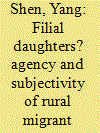

|
|
|
|
|
| Summary/Abstract |
In China, continuous rural–urban migration on a massive scale disrupts the traditional rural patriarchal society and makes the temporary non-patrilocal way of residence possible. This new residential pattern has brought profound changes to the lives of migrants. Based on participant observation and interviewing, this article intends to explore the exercise of agency and the representation of subjectivity of female migrant workers in intimate relations after migration. By emphasizing the intergenerational relationship and partner relationships of both unmarried and married women, I demonstrate a complicated picture regarding the changing status of rural migrant women and show how these women both conform and challenge the social norm of filial obligations, through which their agency is exerted and subjectivity is crafted.
|
|
|
|
|
|
|
|
|
|
|
|
|
|
|
|
| 4 |
ID:
146516
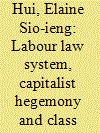

|
|
|
|
|
| Summary/Abstract |
This article investigates how the Chinese labour law system has helped to reproduce capitalist hegemony, i.e. the ethico-political, moral and cultural leadership of the ruling class. Based on intensive fieldwork in the Pearl River Delta and 115 interviews with migrant workers, this article shows that the labour law system has exercised a double hegemonic effect with regards to capital–labour relations and state–labour relations. Through normalizing, countervailing, concealing and transmuting mechanisms, the labour law system has been able to buffer both the market economy and the party-state from workers’ radical and fundamental criticism. However, the double hegemony mediated through the labour law system has influenced the Chinese migrant workers in an uneven manner: some of them have granted active consent to the ruling class leadership; some have only rendered passive consent; and some have refused to give any consent at all.
|
|
|
|
|
|
|
|
|
|
|
|
|
|
|
|
| 5 |
ID:
146512
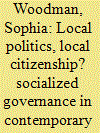

|
|
|
|
|
| Summary/Abstract |
The demise of collective units that attach citizens to the state in China has been overstated; the hegemonic form of Chinese citizenship today links participation and welfare entitlement to membership in a collective unit in a specific locality. This article presents an ethnographic account of the operation of this “normal” form of local citizenship in resident and villager committees in Tianjin. These committees combine participatory and welfare dimensions of citizenship in one institutional setting. Here, citizens are bound to the state through a face-to-face politics that acts both as a mechanism of control and a channel for claims-making, a mode of rule I term “socialized governance,” which blurs the boundaries between political compliance and social conformity, and makes social norms a strong force in the citizenship order. While variably achieved in practice, this form of citizenship represents an ideal that shapes conditions for politics and perceptions of inequality.
|
|
|
|
|
|
|
|
|
|
|
|
|
|
|
|
| 6 |
ID:
146519
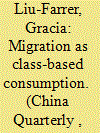

|
|
|
|
|
| Summary/Abstract |
Labelled as the third wave of migration out of post-reform China, the recent emigration of wealthy Chinese has attracted worldwide attention. Although this form of mobility involves primarily the richest 0.1 per cent of the Chinese population, the high profile of the people who move and the amount of wealth implied have made it a sensational social phenomenon. Through interviews, participant observation and media reports, this paper searches for the social meanings of this trend of emigration. Journalists generally attribute the exodus of the rich to a desire to secure their wealth, an aspiration for a different education for their children, or concerns with air pollution and food safety. What this paper argues is that underneath these stated motivations, emigration is in fact a form of class-based consumption, a strategy for class reproduction, and a way to convert economic resources into social status and prestige. “Emigration” (yimin), a form of mobility that may not entail settling abroad, is a path created by wealthy Chinese striving to be among the global elite.
|
|
|
|
|
|
|
|
|
|
|
|
|
|
|
|
| 7 |
ID:
146515
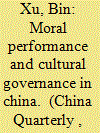

|
|
|
|
|
| Summary/Abstract |
This article examines the Chinese state's moral performance during several major disasters, including the 2008 Sichuan earthquake, the 1998 Yangtze River floods, and the 1976 Tangshan earthquake. Drawing on the theatrical theory of symbolic politics, I argue that the Sichuan earthquake marked a turn in the state's moral performance. While the Chinese state continued to project an image of a secure, heroic state, it endeavoured to construct a sympathetic image through leaders' displays of compassion and sorrow, a mourning ritual for ordinary victims, and narratives of response and rescue. This shift towards a more compassionate performance can be explained by the state's deployment of cultural resources to respond to societal challenges since the new millennium and its effort to repair its image amid the crises of 2008. The compassionate performance was temporarily effective because it found common ground with the traditional political culture of disaster, which still shapes the public's expectations of the state's moral conduct, and the new public culture that values equality and dignity of human life. Nevertheless, the political dilemmas of the compassionate performance became evident. Its efficacy largely relied on the presentation of suffering at the scene, which, however, led to public demands for the state to address the causes of the suffering. When the state failed to construct an “accountable state” image, this “dilemma of scene” had repercussions for its legitimacy. The efficacy of paternalism was also limited because it was less appealing to the growing urban middle class. By addressing moral performance, this paper contributes to the literature on politics of disaster and advances the important research agenda on cultural governance.
|
|
|
|
|
|
|
|
|
|
|
|
|
|
|
|
| 8 |
ID:
146513


|
|
|
|
|
| Summary/Abstract |
Conflicts between urban street vendors and city regulators have become a common urban sight in Chinese cities today. This paper considers how visions of modern urban streets and sidewalks have helped to generate increasingly restrictive policies on street vending and spurred new forms of urban regulation and policing. While mostly an everyday routine of Chinese city life, the resulting vendor–chengguan conflicts dramatize state power in public and carry the latent danger of crowd violence in response. In particular, aggressive policing of highly visible city streets can at times produce a volatile “politics of the street” involving episodes of vendor resistance and even dramatic expressions of bystander solidarity which challenge these street-level expressions of state power.
|
|
|
|
|
|
|
|
|
|
|
|
|
|
|
|
| 9 |
ID:
146514
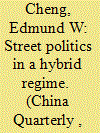

|
|
|
|
|
| Summary/Abstract |
This paper examines the diffusion of activism in post-colonial Hong Kong through the lens of the political regime and eventful analysis. It first reveals the institutional foundations of the hybrid regime that allowed the creation of a nascent movement society. It then explains how the historic 1 July rally in 2003 and a series of critical events since 2006 have led to a shift in scale and the public staging of street politics. A time-series analysis and onsite survey further capture the dynamics that spawned the collective recognition of grievances and reduced participation costs, leading to the Umbrella Movement. While the spontaneous, voluntary and decentralized organizational structure sustained protest momentum, the regime has adopted hybrid strategies to counter-mobilize bottom-up activism. The result is widening contention between the state and civil society and within civil society, or the coexistence of regime instability and regime longevity, a trend that is increasingly common in hybrid regimes encountering mass protests.
|
|
|
|
|
|
|
|
|
|
|
|
|
|
|
|
| 10 |
ID:
146510
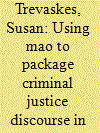

|
|
|
|
|
| Summary/Abstract |
“Strike hard” anti-crime campaigns, “harmonious justice” and “stability maintenance” are the three key politically inspired agendas of crime control and punishment in 21st-century China. This paper is a study of how discourse has helped to package these agendas and to mobilize politico-legal functionaries into action. It examines discourse in the first weeks of the 2014 “people's war on terror” and the agendas of “harmonious justice” and “stability maintenance” in the Hu Jintao era. It finds that each has been rationalized and shaped by an understanding of the utility of punishment based on Mao's utilitarian dialectics. The political virtuosity of Mao's dialectics is that it can be adapted to suit any political situation. In understanding how Mao connects with criminal justice in China today, this paper identifies what is the “political” in “politico-legal” discourse in the fight against crime in the 21st century.
|
|
|
|
|
|
|
|
|
|
|
|
|
|
|
|
| 11 |
ID:
146518
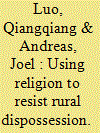

|
|
|
|
|
| Summary/Abstract |
In this paper, we examine the role played by religion in a struggle waged by Hui Muslim villagers against land expropriation. Religion can provide powerful resources for protest movements, especially for religious minorities, but it can also be dangerous. This is particularly true in China where the state has had little toleration of autonomous organization and has long been suspicious of religious organization, especially among ethnic minorities. Scholarly literature about collective action by religious minorities in China has focused on protests about cultural and political issues – and the repression of such protests – but there has been relatively little scholarship about protests by religious minorities over economic issues. The number of protests over economic conflicts has increased in recent years, and the state has been more tolerant of economic than of political protests. These conditions have shaped the following questions: what happens when villagers employ religious ideas and use religious organization to advance economic demands? How effective are religious ideas and organization as tools of mobilization? How do government authorities respond?
|
|
|
|
|
|
|
|
|
|
|
|
|
|
|
|
|
|
|
|
|